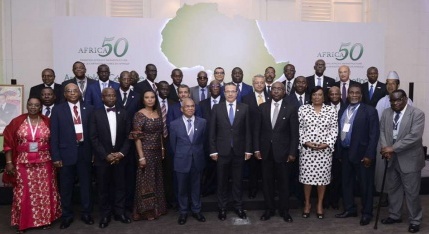By Bamuturaki Musinguzi
Published March 1, 2015
 That religious intolerance is one of the major causes of conflicts and wars around the world isn’t up for debate. That dialogue is key to settling faith-based differences isn’t also up for debate.
That religious intolerance is one of the major causes of conflicts and wars around the world isn’t up for debate. That dialogue is key to settling faith-based differences isn’t also up for debate.
However, while marking the annual World Interfaith Harmony Week in February 2015, Uganda didn’t take anything for granted. Nile Dialogue Platform (NDP) in partnership with the Inter-Religious Council of Uganda (IRCU) organized a dialogue meeting and dinner in commemoration of the week in Kampala on February 4, 2015.
RELATED: Eastern African Religious Leaders Train in Media and Information Literacy
The week, a global event that usually runs during the first week of February, was held on the theme “Welcoming the Other in Love and Dialogue†as part of the religious leaders’ contribution towards building a harmonious Uganda. In his keynote address, John Wynand Katende, the Episcopal Vicar in charge of Public Relations at the Kampala Archdiocese, said humanity is united by the same search for the truth, harmony and peace.  “The inability of non-believers to find this same God becomes an open challenge and an appeal to believers to purify their faith so that their God becomes accessible to all,†he said. “Believers must resist the temptation to consider God as their own property, in such a way that they feel vindicated in using force against others. Religious leaders should work together to help their followers to be instruments of God’s love, peace and harmony through interfaith dialogue.”
“The inability of non-believers to find this same God becomes an open challenge and an appeal to believers to purify their faith so that their God becomes accessible to all,†he said. “Believers must resist the temptation to consider God as their own property, in such a way that they feel vindicated in using force against others. Religious leaders should work together to help their followers to be instruments of God’s love, peace and harmony through interfaith dialogue.”
RELATED: How the Church in Kenya Came to Lose the Prophetic Voice
Joshua Kitakule, the secretary general of IRCU, noted that inter-faith harmony and action has become more critical than ever before in today’s world. Faith and religion can no longer be ignored in building social cohesion, socio-economic development, peace-building and conflict transformation and also in ensuing good governance. Our prophetic mission and mandate as faith communities are indispensable and irreplaceable. “In a world marred by violence, intolerance, corruption, exploitation, instability and hatred, the need for champions who use non-hegemonic, non-confrontational and non-violent initiatives moderated through dialogue to cultivate a culture of peace and harmony, is much needed,†Kitakule said. Saying today’s world harbours people who have turned religion into a source of conflict instead of being a resource for peace, Hakan Ulus, Chairman of NDP, noted, “We all have a duty to speak out against evils committed in the name of religion and to promote religious harmony and peaceful co-existence. Let us all spread the message of inter-faith harmony and goodwill in our churches, mosques, synagogues, temples and other places of worship. Let us all recognize that despite our diversity of religion and race, we are actually one human family and our commonalities far exceed our differences.”
RELATED: Senegalese Art Gallery Vandalised and Forced to Close for Hosting Gay-Related Exhibition
Kitakule said religious leaders in Uganda envision what he termed a ‘Harmonious Nation’ in which “there is mutual respect among people who, despite their cultural, ethnic, religious, gender and political diversities, are given equal space to express themselves without fear for harassment, victimisation and marginalisation.†World Interfaith Harmony Week is an annual event observed during the first week of February. It was institutionalised by the UN General Assembly in 2010 in special recognition of inter-religious dialogue and mutual understanding as key ingredients for nurturing a culture of peace and harmony. Since 2011, this special week has been observed worldwide to promote harmony among all people regardless of their faith.




